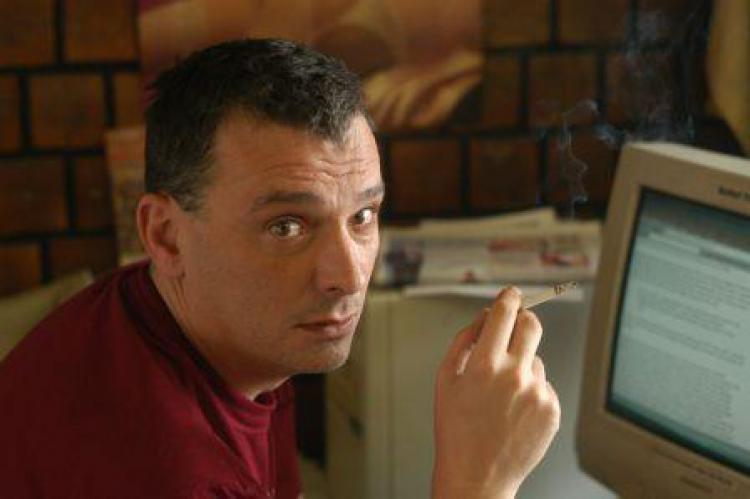Featured Writer: Dejan Anastasijevic
Democracy: a consultation between free citizens or a jungle prowled by pressure groups?
Ine Pisters interviews Dejan Anastasijevic
The form of democracy that has developed in Western Europe is being copied in the rest of Europe. Can or should this model be exported to the rest of the world?
One of my favourite quotes is from Gandhi, whose answer to this question was: ‘Democracy is an extremely good idea'. I come from Serbia, which, geographically at least, is part of Europe. Since the end of the Ottoman Empire in the 18th Century, Serbia has had close links with Europe. Two hundred years ago, Serbia was one of the first constitutional monarchies in the Balkans. Before the Second World War, it had a lively parliamentary life. And after the Second World War we had fifty years of communism, but not Soviet-style communism. Tito reigned as a sort of absolute monarch. He grew up in Austria-Hungary and reproduced its multi-ethnic nation model in miniature. But his ideological approach was very superficial. Although there are often arguments to the contrary, the Balkans are not all that different to Europe. They are a border area between East and West, although these labels can be dangerous. Just like most of the other ex-Yugoslavian countries, Serbia is now a democracy. This morning, I even read it in a Human Rights Watch report: Serbia is officially a free country (laughs). More specifically, it is clearly a European-style democracy rather than an American or Asian version of one. The European model is a natural fit for the Balkans. I am not at all sure that the European model would work in the Middle East, Asia or South America. I don't think West European democracy is perfect, at least not in the part of the world where I live; it is simply the best that we've managed to come up with so far.
How has the communist period changed our thinking about (the need for) democracy?
Even under the one-party system, Yugoslavia experienced quite a high degree of pluralism. There were numerous ways to engage with all kinds of different cultural and even political groups. There was a high level of tolerance, provided you steered clear of a couple of holy cows, like Tito and the one-party system. But within that framework there was still a place for culture and art. This is one of the biggest differences between the former Yugoslavia and the Eastern Bloc. We had fewer restrictions, one example being travel. During the Communist period it was easier to travel from Belgrade to the West, for example. Now it is a terrible problem, not only in Serbia but also in Kosovo, in Bosnia, in Macedonia. The Croats have managed to escape the visa system since their country has become an EU membership candidate. But everyone else is forced to go through a long-winded, degrading process to obtain a visa, even for just a short trip to the West.
There's still a wall.
Yes, a great big wall. It stretches on and on and it's really damaging, because mobility is hindered as a result. A huge proportion of the young generation has never been abroad.
After 1989 you'd have expected all that nonsense to be over and done with.
You're right to say that we had high expectations, but things still aren't OK. For example, academics who are invited to attend a conference at a European university are unable to accept, as they will be refused a visa on the grounds that their salary isn't high enough. The fear is that they would stay on in Europe illegally. This system makes our isolation worse. The countries that came into existence after the collapse of Yugoslavia are extremely small. If you drive for an hour or two you reach yet another border, where you have to show all kinds of documents to be allowed to travel on. The smallness of these countries and the border controls encourage an increase in xenophobia and parochialism. But all in all, the region is improving in comparison to the nineties.
When I was young, I discovered ideologies one by one. The world was like an ideological supermarket where you could find a different ideology on every shelf and just take what you needed. Which path you chose didn't seem of any great importance. It was only later that I learnt how important these choices actually were. I'm also more conservative than I used to be. I value conservative values more than I used to. And that's because these values were missing for a time in my country. Another thing I've learnt to value is the basic concept of ‘decency': dignity, politeness, propriety, respect. Just saying hello to someone, or ‘How are you?' In short, respecting people, showing a basic level of respect. In all the big crises we experienced, that was the first thing to disappear: respect. That's why it's something that should be cherished and valued. That simple thing called human dignity, and politeness. It needs to be well protected, because it's the first thing to go. It makes me think of the canaries that mine workers took with them underground, to warn them of the presence of dangerous gas. As soon as simple politeness disappears from cultural and political values, you can be sure that something terrible is about to happen.
Latest news
-
18.04.24
-
04.04.24
-
26.03.24
-
21.03.24
-
08.03.24







